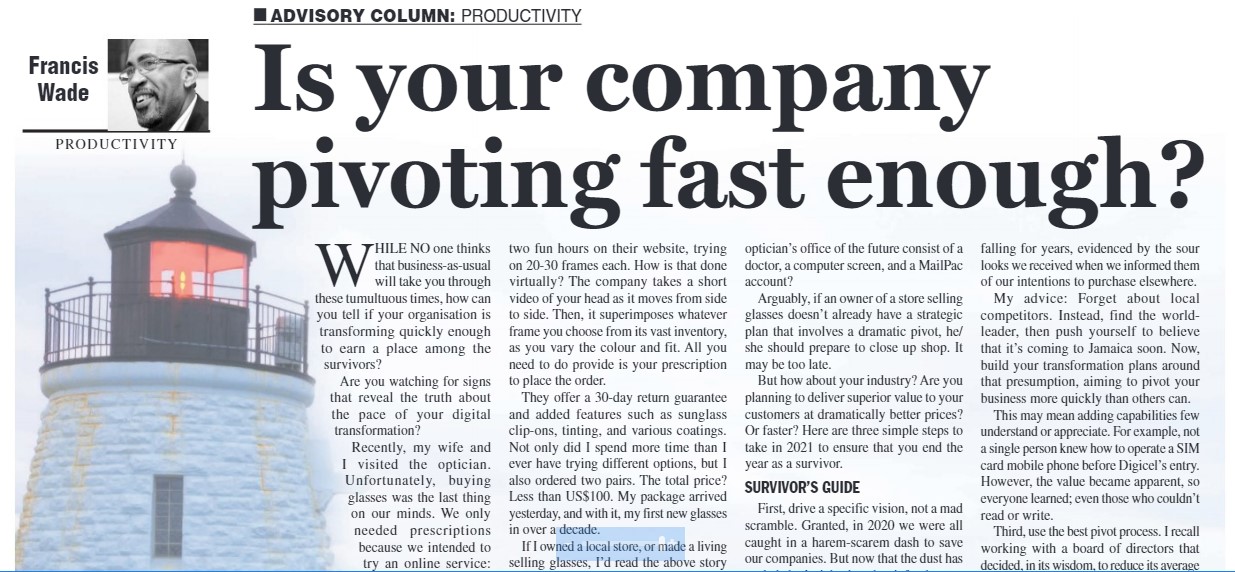While no-one thinks that business-as-usual will take you through these tumultuous times, how can you tell if your organization is transforming quickly enough to earn a place among the survivors? Are you watching for signs that reveal the truth about the pace of your digital transformation?
Recently, my wife and I visited the optician. Unfortunately, buying glasses was the last thing on our minds. We only needed prescriptions because we intended to try an online service: Zenni Optical.
Together, we ended up spending about two fun hours on their website, trying on 20-30 frames each. How is that done virtually? The company takes a short video of your head as it moves from side to side. Then, it superimposes whatever frame you choose from its vast inventory, as you vary the colour and fit. All you need to provide is your prescription to place the order.
They offer a 30-day return guarantee, and added features such as sunglass clip-ons, tinting and various coatings. Not only did I spend more time than I ever have trying different options, but I also ordered two pairs. The total price? Less than US$100. My package arrived yesterday and with it, my first new glasses in over a decade.
If I owned a local store, or made a living selling glasses, I’d read the above story with a sense of dread. This particular digital transformation delivers the same product at the end of the day, but disrupts the traditional choosing and ordering experience. Will the optician’s office of the future consist of a doctor, a computer screen, and a MailPac account?
Arguably, if an owner of a store selling glasses doesn’t already have a strategic plan that involves a dramatic pivot, he/she should prepare to close up shop. It may be too late.
But how about your industry? Are you planning to deliver superior value to your customers at dramatically better prices? Or faster? Here are three simple steps to take in 2021 to ensure that you end the year as a survivor.
1. Drive a Specific Vision, Not a Mad Scramble
Granted, in 2020 we were all caught in a harem-scarem dash to save our companies. But now that the dust has settled, don’t sit back and wait for the next disruption to come along.
In fact, if you haven’t defined a detailed mid to long-term destination such as the 25-year vision Grace Kennedy crafted in 1995, you could be in trouble. Perhaps your stakeholders, tiring of the non-stop drama, may already be asking: “Why bother?” or “What’s the point?”
Reacting to one crisis or opportunity after another is exhausting, even if you do so successfully. Eventually, customers, employees and shareholders start looking for alternatives. In fact, you should reject their blind “loyalty” as a temporary glitch. It only lulls you into complacency, while delaying their inevitable withdrawal. Keep them engaged by redrawing and communicating your preferred vision of the future.
2. Find the Best Role Models
Companies often relax their efforts to hit world-class levels, arguing that Jamaican customers are willing to accept a lower standard. The truth is, my optician’s customer service has been falling for years, evidenced by the sour looks we received when we informed them of our intentions to purchase elsewhere.
My advice? Forget about local competitors. Instead, find the world-leader, then push yourself to believe that it’s coming to Jamaica soon. Now, build your transformation plans around that presumption, aiming to pivot your business more quickly than others can.
This may mean adding capabilities few understand or appreciate. For example, not a single person knew how to operate a SIM card mobile phone before Digicel’s entry. However, the value became apparent, so everyone learned; even those who couldn’t read or write.
3. Use the Best Pivot Process
I recall working with a board of directors which decided, in its wisdom, to reduce its average age over time by 10 years. The logic was brutal: it desperately needed young blood.
This kind of tough approach might not fit your company, but it’s not enough to say “No.” You must create a change plan that works for your environment, and delivers the result you want. In other words, you need to manage the transformation in all its dimensions so that you don’t miss a step.
Consider: if your organization is lacking the right vision, outstanding role models, and a credible change process, then you are sewing the seeds of your obsolescence.
The harsh logic is that people are seeking value from wherever it may be found, just as they always have. New technology simply fast-forwards their search, disrupting everything.
Today we are witnessing the destruction of industries at an unprecedented rate. You must pivot fast to keep up.
Francis Wade is the author of Perfect Time-Based Productivity, a keynote speaker and a management consultant. To search prior columns on productivity, strategy, engagement and business processes, send email to columns@fwconsulting.com

